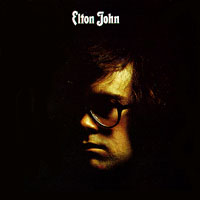 Elton John I suppose it will never be truly fashionable to like Elton John, despite stuff like Ben Folds's dorky posturing of Elton's early approach. I do believe that time will bear out the inherent quality of most of Elton's output, especially the "classic years" covered by the Rocket Records reissue project. It's tough to distinguish between liking Elton John from a "classic rock" perspective and from a songwriting perspective, since so much of his great material has been utterly beaten into the ground by radio. But people should really take the plunge, ignoring the fact that they know and do not like most of the radio hits—these are great, great albums. Elton John is Elton's first real album (Empty Sky preceded it but wasn't his best foot forward) and it's a ballsy album. Kicking off with the always gorgeous "Your Song," you'd expect a pretty ballad-oriented album, but in fact the rest of the tracks are either dark or rocky. About "Your Song": why do all rock critics feel compelled to hate this song? It's beautiful, and the lyrics (often cited for being idiotic) are pretty clever for ol' Bernie Taupin. Get over it, yes it's played to death on "Lite-FM" stations everywhere – it's one of the many Elton John songs that make perfect sense when you hear the whole album. Some folky baroque-isms carry over from Empty Sky ("I Need You to Turn To," "First Episode at Hienton"), plus a couple Rolling Stones-style acoustic rockers ("Take Me to the Pilot," "No Shoe Strings on Louise"), but the bulk of Elton John is given to gothic, string-laden pop songs the likes of which no one but Elton has ever really done. "First Episode" begins the assault: it's a forgotten Elton classic, probably because it meanders a bit. Pretty chilling, actually; I can totally see Tori Amos covering it once she comes back to our world. This song, a completely lesser Elton song, makes Ben Folds's best look like Silly Putty on post-it notes. 🤷 "Sixty Years On" is one of Elton's best, utilizing some of the best-recorded strings I've ever heard on a pop song. Another very chilling tune. You sort of think of early Elton John as all that piano-pounding, but there's a large portion of this album in particular that doesn't even use piano at all. Perhaps some oldsters will write this off as another pretentious pop/classical fusion (I mean, maybe if you were there, it seemed like everyone was doing it) but I find it utterly amazing. Then comes "Border Song" (a/k/a "Holy Moses"), another classic (check out the Aretha Franklin version, too). Perfectly executed. You begin to understand why Elton John commanded so much attention; he's electrifying. And while hindsight informs you that years later he'd be doing "That's What Friends Are For," you can't hold Young Elton responsible. "The Greatest Discovery" is another Tori-like weird piano ballad, followed by "The Cage" which is the weakest song on the album (and quite similar to "Sufferin' Before Suffrage" from "Schoolhouse Rock!"). Someone ought to have voted down the synthesizers. I wonder if maybe Vangelis had dropped by to jam? "The King Must Die" continues with the vaguely imagistic lyrical approach that stands out most on "Take Me to the Pilot" and "Sixty Years On," solidifying the oddly conceptual feel to the album, although the songs (if they even are about anything) are probably unrelated. A nice closer to the album, very "last track." The reissue adds three bonus tracks: "Bad Side of the Moon" (great tune, check out the live version on 17-11-70, "Grey Seal" (original version of the Goodbye Yellow Brick Road, another classic song and quite different from the later version) and "Rock 'n' Roll Madonna" (Elton in fake rock mode; um, a good bonus track—would love to see Madonna cover it). Get over yourself and get into Elton John, you'll still respect yourself in the morning. And sell back your Ben Folds CDs while you're at it, especially that g'damn rarities CD.
Review by Green-Green Yashifoto |